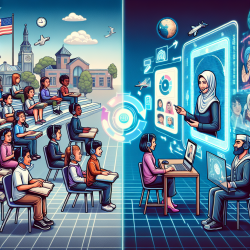As government health regulators, the responsibility of ensuring the well-being and development of children, especially those in need of special education, rests heavily on your shoulders. In a world where technological advancements are continuously reshaping various sectors, it is natural to be curious about the potential of these innovations within the realm of special education. This blog post delves into the transformative power of online therapy services and how they are not only meeting but exceeding the expectations of traditional therapy models in schools.
Special education programs are essential for the support and growth of children with diverse learning needs. However, the accessibility and quality of these services can vary greatly depending on geographical location, resource allocation, and expertise availability. It is here that online therapy services, such as those provided by TinyEYE, step in to bridge the gap, offering consistent, high-quality support to children regardless of their physical location.
Research has been the guiding star in the evolution of teletherapy. Studies have consistently shown that online therapy services are as effective as their in-person counterparts, and in some cases, even more so. The key lies in the ability of online platforms to tailor services to the unique needs of each child, fostering an environment where children can thrive. With a focus on innovation and evidence-based practices, companies like TinyEYE are leading the charge in this educational revolution.
But what does this mean for you, the stewards of public health and education policy? It means that there is an opportunity to reimagine the landscape of special education services. By embracing online therapy services, you have the power to democratize access to essential therapeutic interventions, ensuring that every child receives the support they need to succeed, regardless of their circumstances.
Let's explore the core benefits of integrating online therapy services into special education programs:
1. Increased Accessibility
One of the most significant advantages of online therapy services is the increased accessibility they provide. Children in rural or underserved areas, who would otherwise have limited access to specialized therapists, can now receive high-quality interventions. This is particularly crucial for government health regulators who are tasked with ensuring equitable access to education and healthcare services across diverse populations.
2. Cost-Effectiveness
The cost savings associated with online therapy are considerable. By reducing the need for travel and physical infrastructure, schools can allocate their resources more efficiently. Additionally, the scalability of digital platforms allows for the treatment of a larger number of students without a corresponding increase in costs, making it a financially sustainable option for school districts.
3. Customized Learning Experiences
Online therapy platforms provide an array of interactive tools and resources that can be customized to suit individual learning styles and needs. This personalized approach is often more engaging for children, leading to increased motivation and improved outcomes. The data-driven nature of these platforms also allows for ongoing assessment and adjustment of therapy programs to ensure optimal progress.
4. Collaboration and Support
Teletherapy facilitates better collaboration between therapists, educators, and parents. Through online platforms, stakeholders can easily share information and work together to support the child's development. This integrated approach is critical for children in special education, as it ensures that all aspects of their educational experience are aligned and focused on their success.
5. Professional Development Opportunities
For therapists and educators, online therapy services offer professional development opportunities that were previously difficult to access. With training and resources readily available, practitioners can stay abreast of the latest research and best practices in special education, ultimately enhancing the quality of care provided to children.
It is important to acknowledge the potential concerns surrounding the implementation of online therapy services in special education. Questions about the efficacy, security, and personal connection of digital therapy are valid and require thoughtful consideration. However, the evidence supporting the effectiveness of teletherapy is robust, and with stringent data protection measures in place, the integrity of sensitive information can be maintained. Moreover, the human connection, which is the cornerstone of therapy, remains strong through virtual platforms, as therapists are trained to build rapport and engage with children effectively in the digital space.
As government health regulators, you are in a unique position to influence the trajectory of special education services. By advocating for the integration of online therapy services into school programs, you can ensure that all children, especially those with special needs, have access to the tools they need to reach their full potential. It is an opportunity to lead with foresight, compassion, and a commitment to research-driven solutions that will serve the interests of children and society as a whole.
In conclusion, the landscape of special education is on the cusp of a significant transformation, driven by the capabilities of online therapy services. As digital health solutions continue to evolve, the promise they hold for children in need of special education is immense. It is a promise of accessibility, quality, and inclusion—a promise that can be fulfilled with the support and guidance of informed government health regulators. Embrace the curiosity that comes with innovation, and let it lead the way to a brighter future for special education.
TinyEYE, as a pioneer in the field of online therapy services, stands ready to support and collaborate with government bodies to realize this vision. Together, we can create a world where every child has the opportunity to grow, learn, and succeed, no matter where they are.










